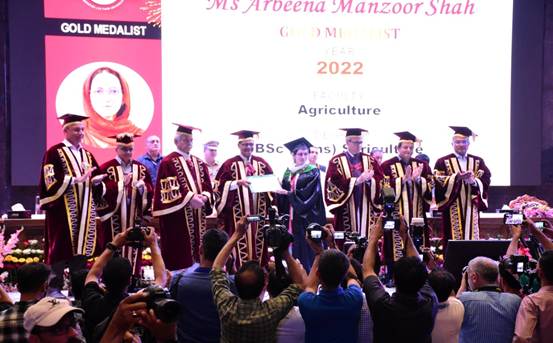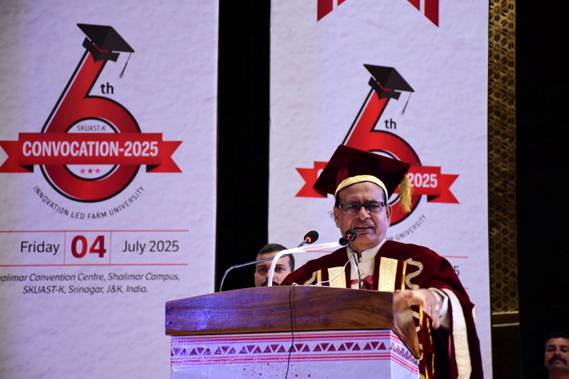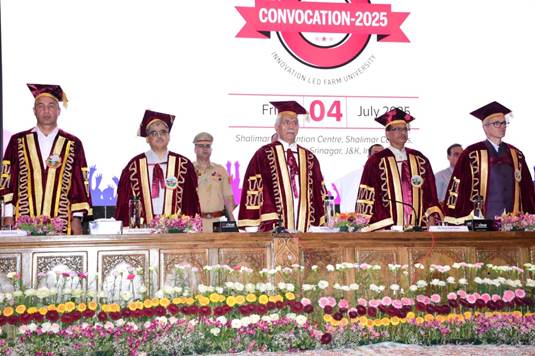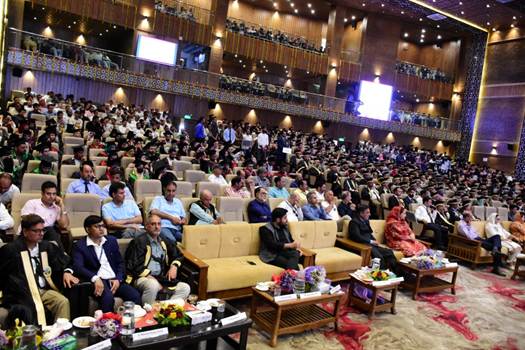Union Agriculture Minister Shri Shivraj Singh Chouhan attends sixth convocation of Sher-e-Kashmir University of Agricultural Sciences and Technology (SKUAST-K) in Srinagar
Union Agriculture Minister Shri Shivraj Singh Chouhan attends sixth convocation of Sher-e-Kashmir University of Agricultural Sciences and Technology (SKUAST-K) in Srinagar
Union Minister for Agriculture, Farmers’ Welfare and Rural Development Shri Shivraj Singh Chouhan on the second day of his visit to Jammu & Kashmir, attended the sixth convocation ceremony of Sher-e-Kashmir University of Agricultural Sciences and Technology (SKUAST-K), Srinagar, and conferred degrees upon the graduates. The event was graced by Lieutenant Governor and Chancellor of the University Shri Manoj Sinha, Chief Minister and Pro-Chancellor of SKUAST-K Shri Omar Abdullah, Agriculture and Rural Development Minister Shri Javed Ahmad Dar, Deputy Chief Minister Shri Rajendra Chaudhary, Education Minister Ms. Sakina Masood, along with vice chancellors, professors, senior officials, and other dignitaries.

While addressing the gathering, Shri Shivraj Singh said, “I’ve been in Srinagar since yesterday. The cool breeze, the fragrance of the soil, the natural beauty, and the warmth of the people have truly touched my heart. Jammu & Kashmir is the crown jewel of India. Yesterday, we had an in-depth review with the Chief Minister on agriculture and rural development. We held extensive discussions on accelerating Jammu & Kashmir’s development. Prime Minister Shri Narendra Modi is determined to build a ‘Viksit Bharat’, and for that, a prosperous Jammu & Kashmir, with its empowered farmers, are essential. We are fully committed to achieving this goal.”

Referring to a past meeting of the NITI Aayog, Shri Chouhan told CM Omar Abdullah, “You had emotionally appealed to ministers to come to Jammu & Kashmir and hold advisory committee meetings. You highlighted how internal conditions are stable and only disturbed by external elements. We accepted your invitation and held the advisory committee meeting yesterday.”

Shri Chouhan shared how he interacted with locals across Srinagar and received overwhelming love and affection. “Even a Shikara boatman on the Dal Lake greeted me warmly. I am deeply moved and will share this affection with the rest of the nation,” he said. He praised SKUAST-K’s accomplishments and expressed confidence that it would soon become the top-ranking state university. He noted that the university hosts students not just from Jammu & Kashmir, but from 30 Indian states and Union Territories, as well as from abroad, making it a nationally and internationally recognised institution.

Speaking to the graduates, he said, “Convocation does not mean the end of learning; it marks the beginning of new knowledge. The lessons you’ve learned in your classrooms and labs must now be shared with society.” He emphasised the irreplaceable value of agriculture, stating that “without farming, neither Jammu & Kashmir, nor the country, nor the world can function. Agricultural produce cannot be made in factories.” He added, “Agriculture remains the backbone of the Indian economy and the primary livelihood for over half the population.”
Thanking Prime Minister Narendra Modi, he highlighted that under PM’s leadership, India’s foodgrain stock has reached record levels, with a 44% increase in foodgrain production over the past 11 years, including record growth in rice, wheat, maize, soybean, and groundnut.
Jammu & Kashmir’s fruits, flowers, and vegetables are exceptional in taste and color, he said, and reiterated his vision to make J&K a global horticulture hub.
He added that the Holistic Agricultural Development Program (HADP) is being implemented successfully in the region. Discussions were held on providing ‘Clean Plants’ under the Mission for Integrated Development of Horticulture (MIDH). Currently, farmers often import planting material from outside the state, which may carry viruses or bacteria. To address this, a decision was made to establish a Clean Plant Center in J&K with a budget of ₹150 crore. He noted that in 5,000 hectares of apple orchards, per-hectare yield has increased from 10 tonnes to 60 tonnes, a six-fold rise. “I want to see Kashmiri apples exported globally so that India doesn’t need to import apples anymore,” he said.
The minister highlighted the Government of India’s commitment to protecting farmers’ interests under the leadership of PM Modi. He called for more innovation in agriculture, urging students to launch startups and develop advanced technologies in the sector. While praising the university’s performance in civil services, he reminded students that true achievement lies in living for others, not just oneself. “Apply practical knowledge, not just theoretical. Each of you has immense potential, and I’m confident you will do well,” he said.
Quoting Swami Vivekananda, Shri Chouhan said, “Man is a storehouse of infinite strength; there is nothing he cannot achieve.” He encouraged students to set goals, make a roadmap, and work persistently for the greater good.
He shared his recent visit to border villages with scientists and the J&K Agriculture Minister, emphasising that development should reach even the most neglected areas. “Make meaningful use of your life and move forward with purpose,” he urged.
Shri Chouhan also spoke about the six-point agricultural strategy outlined by PM Modi, which includes:
He said both central and state governments are working together to implement these strategies. “India belongs not only to itself but to the world. This is a land that considers the entire world as one family,” he concluded, calling for collective efforts to advance Jammu & Kashmir and the nation with the guiding mantra: “Peace, not war; love, not hatred.” He expressed confidence that India would build a stronger global identity and emerge as the world’s food basket.
At the convocation ceremony, nearly 5,250 students received undergraduate, postgraduate, and PhD degrees. Additionally, 150 gold medals and 445 merit certificates were awarded to outstanding students for their academic achievements.
- Increasing production
- Reducing cost of cultivation
- Ensuring fair prices
- Providing proper compensation for losses
- Diversifying agriculture
- Promoting natural farming while preserving land for future generations